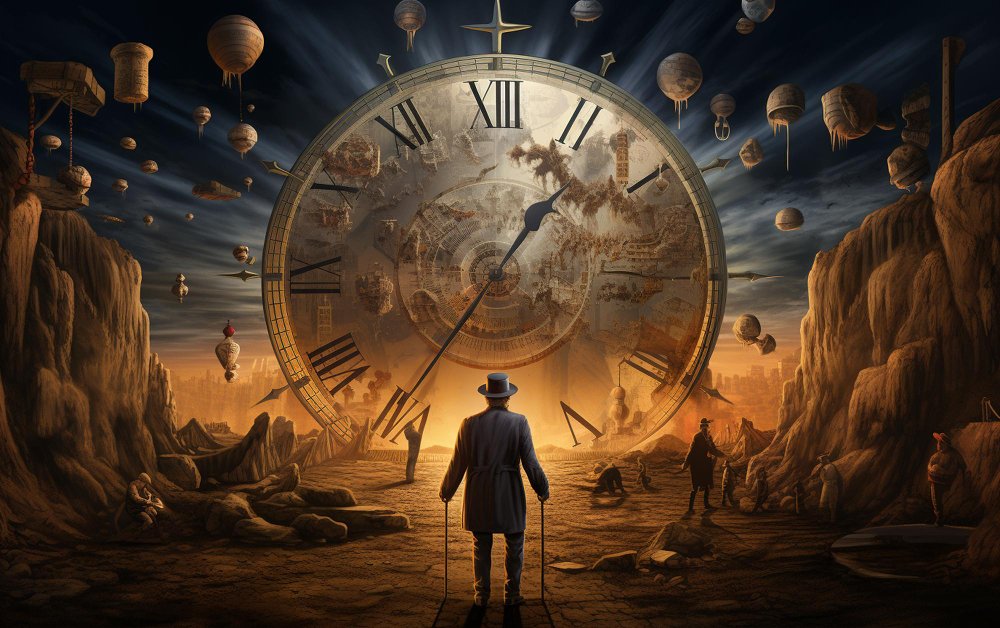
Morris Jastrow1 wrote in 1919 that Israel is a ‘glorified ghetto’. When you think about it, the conditions of Jewish life before the Enlightenment have been perfectly reproduced in Palestine. It’s no wonder the Israelis and their allies are cracking up. Political Zionism is an anachronism.
Many Israeli leaders have claimed religious sanction for their treatment of the Palestinians. At the center of the current bombardment of Gaza is Benjamin Netanyahu, who claims to be following the admonition of Moses (Deut. 25:12–19) that “The Eternal will be at war against Amalek throughout the ages.”
This implies that Israel is commanded to wage a holy war of extermination against Amalek (Deut. 25:12–19), for in the early days “the wars of Israel” and the “wars of the Lord” were synonymous expressions (cf., e.g., Judg. 5:23).
But, unfortunately for Netanyahu, even his supporters did not buy his analogy. His supporters don’t necessarily object to the carnage, just the rhetoric. They worry that announcing a holy war is not a good look for him. But his use of a story from ancient Israel to justify his war reveals the central mistake of the Zionists.
Zionism does not understand the Hebrew Prophets or Jesus
The use of the Old Testament in this way reveals that Zionism is a movement out of place and time. According to Morris Jastrow, this movement ignores what was accomplished by the Hebrew Prophets and Jesus. Jastrow calls Jesus the successor of the Prophets.
Political Zionism is an anachronism
Jastrow had sympathy for religious and economic Zionism. But as a political measure, Zionism was an anachronism. However, the political aspect has dominated since 1897. (p. 31) The only way the Zionists could have pulled this off is by ignoring or denying the religious aspect.
The Prophets: From Ancient Israel to Judaism
If Christians and Jews understood how the Old and New Testament fit together they would reject Zionism immediately. But instead, they are led by dramatic verses taken out of context, such as the story of Amalek. In fact, the Zionist movement itself is out of context.
The Zionists seem unaware that the Prophets made major changes in the religion of ancient Israel. These changes are recorded in the Old Testament. The central concept that resulted from their teachings had to do with nationality and citizenship.
Antiquity interpreted religion in terms of nationality. The basis of nationality and citizenship was a nation’s language and gods. This influenced the organization of religion, including the ancient Hebrew religion.
The Hebrews had a national deity, whom they called Yahweh. He was their protector within the boundaries of their own territory. Within those borders, they were the chosen people of Yahweh. The groups around them were no different. They had been chosen by some other god.
What was the message of the Prophets?
However, for the Hebrews the ancient concept of religion changed with the rise of the Prophets. The Prophets taught that Yahweh is unlike other gods. His concern is conditioned on the obedience of his followers to certain principles. These principles involved ethical distinctions between right and wrong.
But, this was not a theoretical lesson on ethics. The Prophets announced that Yahweh had rejected his people because of the oppression of the poor by the rich, the injustice in the courts of justice, and rampant crime. They said Yahweh would punish the people for their sins unless they would mend their ways.
The Prophet Amos was the first to preach this message. He was followed by Hosea, who made the same prophecy. Then came Isaiah. Isaiah emphasized that sacrifices and tribute are an abomination to Yahweh, and that he does not want his worshippers to defile his holy place by coming there with unclean hands.
These teachings represented a new (religious) language. Their significance lay in the emphasis on the conduct of the individual as the test of religion. From this point onward, the group was considered to represent an entity composed of individuals.
In this process, the national Yahweh was transformed into a universal Jehovah. In other words, Judaism made its first appearance at that time. Judaism is a religion based on a monotheistic conception of divine government, which makes the conduct of the individual the test of religious life. But this transformation would soon be tested.
The effect of the Babylonian exile
Hebrew nationalism was made extinct after a Babylonian monarch, Nebuchadnezzar, destroyed the Jewish state. As a result, the Hebrew religion changed. It came to worship a God who was no longer tribal and confined to a specific territory. It worshipped a God who was universal, a God who was concerned for all mankind. The experience of exile and the new understanding of God that accompanied the exiles cut the bond between religion and nationality. The transformation into Judaism was complete.
It is a fact of the utmost significance that the great contribution of the Jews to the world’s spiritual treasure was made not while the national life was flourishing, but as it was ebbing away. The Prophets with their revolutionary doctrines made their appearance when the northern Kingdom was beginning to show symptoms of decline, and the movement reached its height after this kingdom had disappeared and the national existence of the southern Kingdom was threatened. The religion of the Prophets is the swan song of ancient Hebraism, and the example of a people flourishing without a national background had to be furnished to the world in order to bring the new conception of religion to fruition, which divorced religion from nationality and made it solely the expression of the individual’s aspiration for the higher life and for communion with the source of all being. The ancient Hebrews disappeared. It was the Jews, as we should call the people after the Babylonian Exile, who survived, and they survived despite the fact that they never recovered their national independence in the full sense of the word.
Jastrow, p. 38
The theocratic state
Judaism changed the people from a political to a religious unit. However, this process proved to be too much for the masses and they yearned to go back to their nationalistic ways. Jastrow defines what they were going through as the ‘wrenching of the political from the religious life’. He thought the strange phenomenon of a Prophet who is also a Priest was a response to this difficulty. But it was a step backward.
The Prophet-Priest Ezra created a new code. Ezra’s code was combined with the two earlier codes in Exodus and the Book of Deuteronomy. This framework of early traditions and tribal experiences became the Pentateuch. The Pentateuch served as the basis of religious life. It also recognized the solidarity of the Jews as a political unit. The result was that Israel was so dominated by the priestly ideal that a theocratic state came to be.
The ministry of Jesus
Second Isaiah and the other ‘writing’ Prophets after the Babylonian exile opposed this development because the theocratic state led the Jews to focus on national aspirations.
Beginning with Amos, the Prophets before the exile had envisioned a time when the Jewish people would set an example for the world to worship the ‘supreme Author of all being‘. But the theocratic state reattached the religion to what remained of the national life. This was the situation Jesus confronted in his lifetime.
The universal Jehovah had not entirely put aside the rule of the tribal Yahweh. Yahweh was still viewed as the special protector of His chosen people by the side of His traits as the God of universal scope. The crisis came in the days of Jesus, who, as the successor of the Hebrew Prophets, drew the logical conclusion from their premises and substituted for the national ideal that of the ‘Kingdom of God…Render unto Caesar the things that are Caesar’s, and unto God the things that are God’s’. By such a single saying Jesus broke definitely with all nationalistic aims, which even during the period of Roman control, strict and complete as it was, the Jews did not entirely abandon.
Jastrow, pp. 41-42
According to Jastrow, it is an error to suppose that the Jews rejected the religious teachings of Jesus. They could not have rejected his teachings. Jesus taught in the same spirit as their own Prophets. What they rejected was Jesus’s uncompromising insistence that religion was a matter between the individual and his conscience. They were prevented from accepting this idea both by their own traditions and attitudes and by the religious concepts that surrounded them.
When St. Paul came to give the doctrinal setting to the teachings of Jesus, and to interpret the meaning of his life with its tragic end, he laid the chief emphasis on the salvation of the individual through the acceptance of the belief in Jesus. The sins of the world were washed away through the blood of Jesus as a vicarious offering for mankind. Every individual was offered the opportunity of securing salvation for his soul by accepting Jesus as his saviour…
Jastrow p. 45
Did something similar happen to Christianity?
However, Jastrow also identifies a continuing tendency to connect religion and nationality among Christians. He blames this on the Church’s ‘Zionistic temptation’ to become allied with Rome. I hesitate to bring this up because of the fear that some denominations will feel justified in their criticism of Catholicism. But it’s important to remember that many Protestant denominations built forts around their own theology. If I’m not misunderstanding Jastrow, I think this Zionistic tendency can be interpreted differently.
It could be argued that it was the Roman emperors who first legalized Christianity and then made it the official religion of the Roman Empire. If the Church fathers agreed to this, perhaps they mistook it as a universalistic alliance. Jastrow does say (p. 45) that this alliance appeared in a form that at first appeared international.
Conclusion
This article demonstrates that political Zionism is anachronistic. Christian and Jewish Zionists are trying to carry out a scenario that no longer exists, and can’t be defended in the scriptures. In fact, they are going in the opposite direction to what their own Prophets intended. If we look again at Netanyahu’s use of the story of Amalek as justification for bombing Gaza, it becomes clear that a tribal Israel ruled by a nationalistic God is a thing of the past. The wars of Israel and the wars of the Lord are no longer synonymous. Israel’s God became a universal God when the Israelite nation was destroyed and the people were carried away to Babylon. Then Jesus, as the successor to the Prophets, reinforced the Prophetic teachings.
Christianity, as we have seen, broke at its foundation with Jewish nationalism. It definitely cut the thread that bound religion to the limitations inherent in associating religion with the group.
Jastrow p. 44
Next it will be necessary to understand the difference between the religious practice of Christian Zionists, orthodox Christians and Jews.
- Morris Jastrow Jr. Ph.D, LL.D, Zionism and the future of Palestine: the Fallacies and Dangers of Political Zionism, The Macmillan Company, NY, 1999 ↩︎

